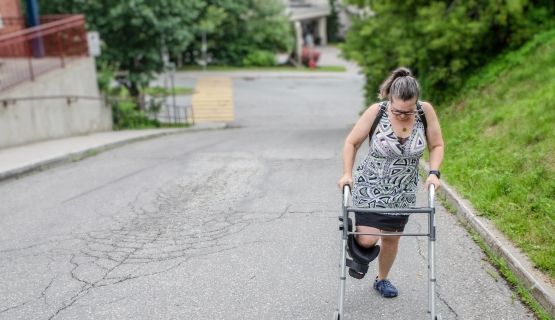Return to work, accommodation and support
IWH has a long history of conducting research on practices, policies and processes that help workers sustainably return to work after an illness or an injury. This page pulls together IWH research and resources on employer supports, job accommodations and modifications, as well as other related issues such as disclosure of disability.
Featured

At Work article
Injured workers face mental health challenges beyond diagnosable conditions
Workers with a work-related physical injury that takes them off the job can have a wide range of mental health experiences, beyond diagnosable conditions. That’s according to an IWH study which also found that differences in injured workers’ mental health were linked to return-to-work outcomes.
Published: April 9, 2025

Research Highlights
Examining four types of job disruptions due to a health condition, and the differences expected when workplace support needs are met
Job disruptions are common among workers living with chronic physical and/or mental health conditions, an IWH study has found. The study investigated the effects of workplace supports had on four types of job disruptions.
Published: March 11, 2025

IWH in the media
Workplace health conversations are awkward: A new tool is here to help.
Todd Humber reports on discussions about chronic health accommodations at work, profiles the role of the Job Demands and Accommodation Planning Tool (JDAPT).
Published: OHS Canada, April 2023
IWH Speaker Series
IWH Speaker Series
Unveiling the JDAPT: A new interactive tool to identify work-related support strategies for workers with chronic conditions and disability
Many workers with chronic physical and mental health conditions struggle when deciding whether to seek support from their workplace. The Job Demands and Accommodation Planning Tool (JDAPT) is designed to help address the complexity of disclosure decisions. Developed as part of a large research partnership, the JDAPT is an online, interactive tool that guides users through a series of simple questions about their job demands, job tasks and working conditions. In this presentation, Dr. Monique Gignac describes the JDAPT tool, its development, as well as data from two studies on the tool. She discusses the JDAPT’s potential to help workers by focusing on work solutions, not medical diagnoses and symptoms.
Published: March 2023

IWH in the media
Accommodation tools aims to bridge gaps between workers and employers
An article by Shane Mercer covering an interview with Monique Gignac about the newly released Job Demands and Accommodation Planning Tool (JDAPT) tool for workers, and the soon-to-be-released version of the tool for employers.
Published: Canadian Occupation Safety, March 2023

IWH in the media
Tool to help workers with chronic and episodic health conditions
Shane Mercer reports on the Job Demands and Accommodation Planning Tool (JDAPT) ahead of it's March 21 launch date, including quotes from Monique Gignac describing the tool.
Published: Canadian Occupation Safety, March 2023
News release
News release
New IWH tool helps workers with chronic conditions find job-tailored supports that allow them to keep working
Published: March 2023

Tools and guides
Job Demands and Accommodation Planning Tool (JDAPT)
This tool identifies job demands that are difficult for a worker with a chronic, potentially episodic, health condition and suggests personalized accommodation ideas tailored to these demands that can help the worker continue to work comfortably, safety and productively.
Published: March 2023

Impact case study
Workers Compensation Board of Manitoba uses IWH research to update its “Return to Work Basics” workshop
When the Workers Compensation Board of Manitoba decided to update its return-to-work training, it wanted to build confidence in the content by including evidence-based guidance from trusted sources. For a key part of the workshop, it turned to the Institute for Work & Health's "Seven Principles."
Published: February 2023
Journal article
Journal article
Experiential aspects of employment and their relationship with work outcomes: a cross-sectional study using a novel measure of participation in workers with and without physical disabilities
Published: Disability and Health Journal, February 2023

IWH in the media
Union calls for national task force to fight violence against transport workers
An article by Jim Wilson on workplace violence in the transit sector cites IWH study on pain post-injury.
Published: Canadian HR Reporter, January 2023
Project
Project
ECHO PSP: Piloting the use of the ECHO model to promote recovery and return-to-work among public safety personnel in Ontario
This pilot project is evaluating the use of the ECHO model in Ontario to improve return-to-work support for injured firefighters, paramedics, police officers and other public safety personnel.
Status: Ongoing